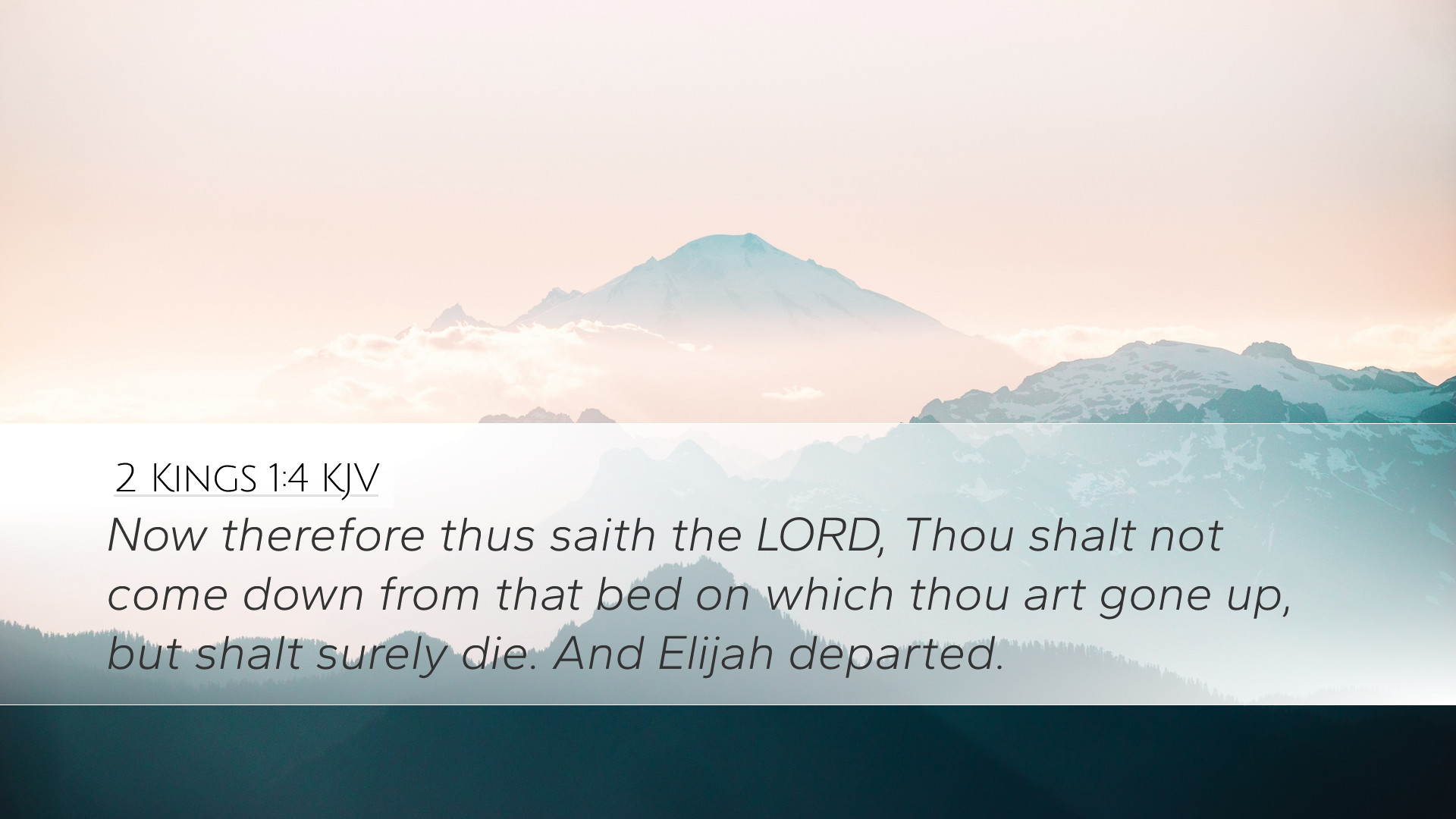Old Testament
Genesis Exodus Leviticus Numbers Deuteronomy Joshua Judges Ruth 1 Samuel 2 Samuel 1 Kings 2 Kings 1 Chronicles 2 Chronicles Ezra Nehemiah Esther Job Psalms Proverbs Ecclesiastes Song of Solomon Isaiah Jeremiah Lamentations Ezekiel Daniel Hosea Joel Amos Obadiah Jonah Micah Nahum Habakkuk Zephaniah Haggai Zechariah Malachi2 Kings 1:4
2 Kings 1:4 KJV
Now therefore thus saith the LORD, Thou shalt not come down from that bed on which thou art gone up, but shalt surely die. And Elijah departed.
2 Kings 1:4 Bible Commentary
Commentary on 2 Kings 1:4
Bible Verse: "Now therefore thus says the LORD: You shall not come down from the bed to which you have gone up, but you shall surely die. So Elijah went away." (2 Kings 1:4, ESV)
Introduction
The verse in focus provides a significant insight into the prophetic role of Elijah, the fate of King Ahaziah, and God's sovereignty over human affairs. This commentary draws insights from public domain sources, elucidating the implications of this moment in biblical history.
Contextual Background
2 Kings 1:4 is situated in a narrative where King Ahaziah of Israel seeks guidance from Baal-Zebub, the god of Ekron, after suffering an injury. Instead of turning to Yahweh, he inquires of a foreign deity, resulting in a prophetic confrontation with Elijah.
As Matthew Henry offers, this moment starkly contrasts the expected behavior of a king whose nation had a covenant relationship with the Lord. Rather than seeking divine guidance, Ahaziah's decision to consult a false god leads to dire consequences.
Divine Judgment
The message delivered to Ahaziah through Elijah is one of judgment and finality. Albert Barnes emphasizes that the pronouncement of death serves as both a warning and a testimony of God's authority. Ahaziah's reliance on false deities is met with divine rejection.
- God's Sovereignty: This verse stresses God's control over life and death. The rejection of Ahaziah's inquiry signifies the supremacy of Yahweh over fabricated gods.
- Prophetic Role: Elijah's role as a messenger underscores the importance of prophetic witness and the consequences of disobedience.
Theological Implications
From a theological perspective, 2 Kings 1:4 invites reflection on several crucial themes:
- Authority of Scripture: The word of the Lord through Elijah holds irrevocable power. A central tenet of faith is highlighted—the need for obedience to God's commands.
- Rejection of the True God: Ahaziah's choice to consult Baal represents a broader human tendency to seek security and wisdom outside of divine revelation.
- Consequences of Idolatry: The fate of Ahaziah serves as a solemn reminder of the spiritual peril that accompanies the worship of false gods.
Application for Today
This text continues to resonate with contemporary audiences. Pastors and theologians can draw parallels between Ahaziah’s sin and modern idolatry—where trust in materialism, power, or secular wisdom often supplants faith in God.
As Adam Clarke points out, the narrative invites believers to evaluate their priorities and allegiances. It challenges the church to reaffirm its reliance on Scripture as the ultimate source of truth and guidance.
Conclusion
2 Kings 1:4 stands as a poignant reminder of God's sovereignty and the severe consequences of turning away from Him. The rejection of divine authority not only affects individuals—like King Ahaziah—but also has broader implications for the community of faith.
In closing, may this verse inspire pastors, students, and scholars alike to reflect on the steadfastness of God’s Word, the perils of idolatry, and the call for believers to seek Him earnestly above all else.


